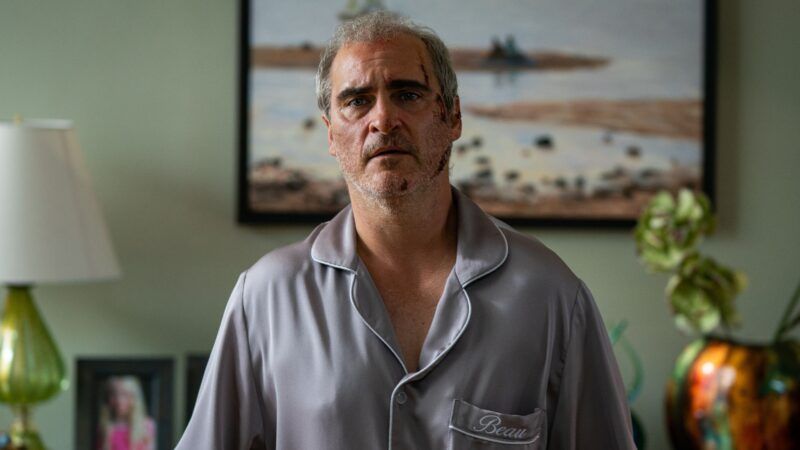Review: Beau Is Afraid
Long story.

Beau Is Afraid comes to us quivering with critical buzz. The writer-director, Ari Aster, has made some electrifying contributions to the horror genre in recent years with his first two films, Hereditary (2018) and Midsommar (2019). And his star this time out, the strange and wonderful Joaquin Phoenix, is certainly a man who knows his way around weird. So this movie's gonna rule, right?
Well, we'll see. The picture does have some of the savage imagery we expect of Aster—especially in the first half, when we pay a visit to an unnamed city that's clearly hell-bound and hopeless, with defective citizens fritzing out on every corner. This is the Aster effect we seek.
However—and it's a big however—the story centers on a dull schlub (Phoenix as the titular Beau Wassermann) whose life has been (and continues to be) ruined by his cruelly manipulative mother, Mona (played as a young woman by Zoe Lister-Jones, and later, with scenery-gobbling abandon, by Patti LuPone). Mommy issues are nothing new at the movies (hello Carrie, hello Psycho, hello Manchurian Candidate), but they seem to be objects of fresh interest to Ari Aster. Which would be okay, maybe, except that his movie is three hours long, and almost every minute of its home stretch might have been custom-designed to crush a viewer's interest. (And this is not a fun horror movie, by the way.)
It's a good-looking picture, though—Aster is once again working with cinematographer Pawel Pogorzelski and he's brought in production designer Fiona Crombie, whose wittily detailed environments bring the movie's early urban innings to rancid life. The story begins with the sounds of a woman—presumably Mona, long ago—giving birth, and then the slap of a hand on a baby's bottom (the old welcome-to-the-world joke). Then we're in the office of a psychotherapist (Stephen McKinley Henderson), who's asking Beau, his patient, if he's ever wished that his mother, whom he's scheduled to visit the following day, were dead. Never, Beau says, unconvincingly. Outside we see crazies and criminals running riot in the streets. A wall bears the scrawled words "Jesus Sees Your Abominations." Beau knows he should be getting ready for his big mom visit, but he can't seem to get it together—it's like he's trapped in a Buñuel movie.
Before long (relatively speaking), Beau gets hit by a car driven by a woman named Grace (Amy Ryan), who tries to make amends by inviting him to recuperate at the suburban home she shares with her surgeon husband (Nathan Lane) and snotty daughter (Kylie Rogers). In the living room, Grace tells Beau to turn on the TV and watch channel 78; Beau does this, and sees himself on the screen, sitting in the living room, watching the TV. It's that kind of movie.
The picture is unafraid to be unpleasant, and it starts becoming arduous when Beau finds his way into some local woodlands, where he encounters an alfresco theatre company called the Orphans of the Forest. These hippy-dip oddballs have rigged up spotlights amid the foliage and trained them on a wooden stage upon which stands a pair of tombstones bearing the words "Mother" and "Father." (In case the picture's tragic parental theme hasn't been leaned on heavily enough, Beau also carries around a broken Madonna-and-child figurine which has been glued back together in sloppy desperation.)
The next stop on Beau's tour of the rambling plot takes him out in a motorboat to an unexpected place where he must suffer through some tiresome babbling by Richard Kind. By this point, Beau has found a woman to have sex with (the movie's only really funny scene) and encountered a big, bloated, not-at-all-scary monster who looks like Jabba the Hutt if Jabba the Hutt had just keeled over. "Whatever" is a useful word to bring along to this film and will surely occur to many viewers when its weirdly blunt conclusion rolls around. The movie ends as if it had suddenly fallen off a shelf.


Show Comments (7)